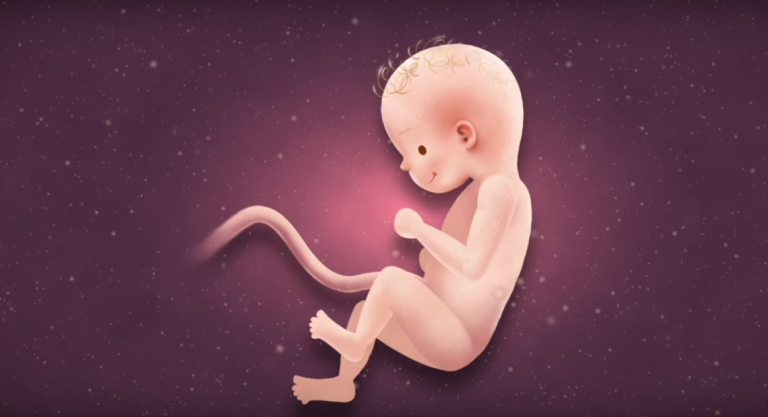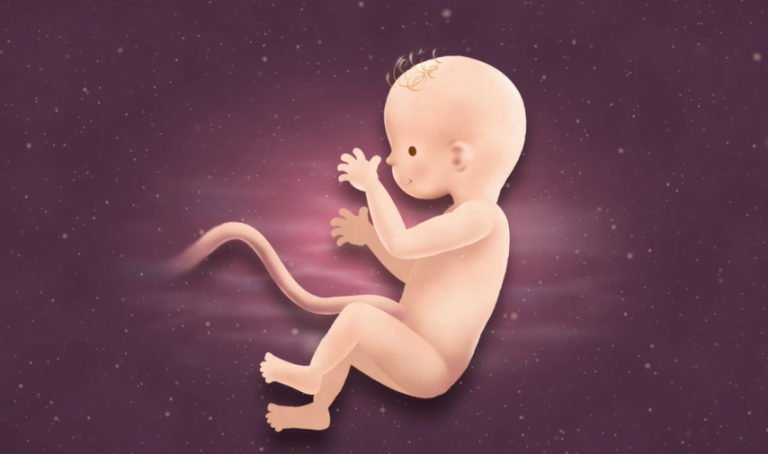Time has passed in the blink of an eye, and before you could even digest the fact that you were pregnant, you entered the sixteenth week. While you have been busy trying to calm your excitement and focus on pregnancy’s mental and physical changes, your baby has grown, developed, and gained several new skills… We know you have many questions on your mind. Don’t worry; we have collected the answers to all your questions about the sixteenth week of pregnancy in this article. Happy reading!
Your Baby at Sixteen Weeks
A week seems very brief to you, but it is a long time for your baby in which he learns many new skills. Let’s examine the details about your sixteen-week-old baby.
How Big is Your Baby at Sixteen Weeks?
One of the things you want to learn at each doctor’s check-up is how much your baby has grown. This excitement will only increase until birth. In the sixteenth week, your baby is the size of a large avocado. In the table below, you can find the average weight and length of a sixteen-week-old foetus.
| Gestational Age | Weight | Length |
| 16th week | 80−140 g | 10−13 cm |
These values are averages and may vary from baby to baby due to differences in the moment of fertilisation, which cannot be determined exactly. If fertilisation occurred later than expected, your baby’s values might be lower. Only your doctor can tell you whether there is cause for concern or not.
Development of the Organ Systems and New Skills
The development of a foetus, which transformed from a single cell into a complex creature with organs and organ systems in just sixteen weeks, is truly astonishing.
- The Nervous System
The skull grows to make room for the developing brain; parallel to this, the organs and sense organs controlled by the brain also evolve. Even in the mother’s womb, your baby will start to react to stimuli from the outside world. As his spinal cord develops, the reflexes it controls, such as holding, sucking, and swallowing, evolve.
- The Circulatory System
As your baby’s blood volume increases, his heart beats harder to pump blood through his veins, spending much energy and beating about 140-150 times per minute.
- The Digestive System
The structures and organs of the digestive system were already formed in the previous weeks. In the sixteenth week, it further matures and gains the capacity to digest food. When the foetus develops his swallowing reflex and swallows amniotic fluid, the nutrients are digested in the stomach and intestines. This process produces a small amount of waste, gradually accumulating in the colon, called the meconium. It is a dark-coloured substance that will be your baby’s first poop after birth.
- The Respiratory System
The respiratory system will be the last system to complete its development. Nevertheless, the sixteenth week has some significant changes in store. Firstly, your baby’s bronchioles form. Your little one not only takes in the amniotic liquid via his mouth but also through his nose, filling the bronchioles with liquid. He is practising inhaling and exhaling air, and his chest rises and falls like breathing. This also causes hiccups, which you will feel later in pregnancy.
- The Musculoskeletal System
Looking at the musculoskeletal system, you will see that your baby’s head is larger than his trunk and legs. This growth ratio will be kept as your baby grows in the coming period. The foetus’s spine straightens, and the calcium accumulation in the cartilage causes ossification, the hardening of the bones. Moreover, his muscles strengthen, and the internal organs that work with the help of muscles, like the heart and the digestive system, also gain functionality.
- The Urinary System
The kidneys and the adrenal glands have increased in size and can now be seen on ultrasound. The glomerulus, the structures within the kidneys, filter the blood and form foetal urine, excreted into the amniotic fluid and placenta.
- The Reproductive System
The internal reproductive organs of a baby girl – the ovaries, fallopian tubes and uterus – have been formed but will develop further. The outer part of the genitals, the vulva, is now prominent enough to be visible on ultrasound.
The internal reproductive organs of a baby boy – the testicles, glands and sperm ducts have been formed. The external reproductive organ, the penis, is now prominent enough to be visible on ultrasound. The testicles have developed but have not yet descended into the upper abdomen and scrotum.
Whatever the gender of your baby, you may be lucky to learn the gender in the sixteenth week. But, if the foetus is not well-positioned, or the umbilical cord hides the area, your doctor may want to wait a few more weeks to give you a definite answer.
- The Endocrine and Immune System
Your baby now has a basic immune system. It is made up of dendritic cells, which defend him against foreign substances, and vernix caseosa, which prevents the baby from getting infections via the amniotic fluid absorbed through the skin.
Your Baby’s Movements at Sixteen Weeks
Your little one is now strong enough to do somersaults, turn, and kick. He can’t sit still and fidgets in the womb. These movements are not so intense that you will clearly feel them yet. His bones and muscles need to develop a little more. You may have to wait a few more weeks to feel this miracle.
A Sixteen-Week-Old Foetus’s Sense Organs
The brain controls the sense organs, and the development of your baby’s sense of sight, hearing, touch, taste, and smell is directly proportional to his brain development. In the sixteenth week of pregnancy, some of your baby’s sense organs are ready to function, albeit still limited.
Let’s look at how much your little one can perceive and sense…
- The Eyes and the Sense of Sight
A foetus’s eyes still stand far apart at sixteen weeks. Nevertheless, they gradually move closer to each other and their final destination on the face. The eye muscles move the eyes in their sockets, but the eyelids can still not open and close.
- The Ears and the Sense of Hearing
The ears can be visible on ultrasound at sixteen weeks, but they have not yet reached their final destination on the head. The number of hearing receptors is rapidly increasing but cannot detect sound waves yet. Your little one needs more time before he can listen to your beautiful voice.
- The Skin and the Sense of Touch
The skin rapidly stores fat, but your baby cannot keep his body temperature yet. Instead, the lanugo hairs, which insulate your baby’s body, continue to increase. Your little one’s eyebrows, eyelashes and hair grow. They are white in colour as there is no pigmentation yet. The skin is transparent, and the internal organs are visible under the skin. As the baby further stores fat in the following weeks, he will become chubby and get a plump baby skin. The sensory receptors on his palms, genitals, and soles of the feet have developed. He can now perceive temperature, pressure, and other tactile sensations in these areas.
- The Tongue and the Sense of Taste
The taste buds form on the tongue. Your baby can now taste the pyruvic acid, lactic acid, creatinine, urea proteins and nutrients from the foods the mother eats in the amniotic fluid he swallows.
- The Nose and the Sense of Smell
The olfactory receptors begin to form in your baby’s nose. These will allow your little one to perceive the smell of the substances in the amniotic fluid which enters his nose.
How Many Months is Your baby at Sixteen Weeks?
Pregnancy is an adventure that lasts nine months and ten days, corresponding to forty weeks. Although we are used to expressing this period in months, your doctor will talk about weeks. So, how can you convert the number of weeks into months? Let us calculate this together:
1 week: 7 days, 1 month: 30 days
16 weeks = 16×7 days = 112 days
112/30= 3 months 22 days
According to this calculation, you have left 3.5 months behind and are almost four months pregnant.
Your Body at Sixteen Weeks of Pregnancy
In merely sixteen weeks, a single cell in your uterus turned into a human being with flawlessly working organ systems. This means a lot is going on in your body. Of course, this translates into a series of pregnancy symptoms. Let’s look at these symptoms at sixteen weeks, why they occur and what may help you cope with them.
- Weight gain
You may not have gained much weight during the first trimester. But, after the third month, your baby’s significant growth also causes weight gain. At sixteen weeks, it’s a good idea to start wearing loose clothes with an elastic waistband or to buy some maternity clothes for yourself.
- Itching and stretch marks
Your skin must stretch to make room for the added weight. If you gain weight suddenly, your skin doesn’t get the time to stretch gradually and stretch marks may appear. They look like pink, yellow, brown or purplish lines. These are, in fact, scars, and while they may fade, they might not completely disappear after birth.
- Oedema
Pregnancy hormones cause an increase in blood pressure and body fluids, which may accumulate in the cells and cause oedema, and increase your body secretions, such as vaginal discharge, sweat and mucus.
- Pain in the lower back and legs
The increase in your baby’s size puts an unfamiliar pressure on your body. Especially your waist and legs carry the weight and are affected. This may result in pains and aches.
- Heartburn and indigestion
The pregnancy hormones slow down your digestive organs, causing indigestion and heartburn. On top of that, the increased pressure of your uterus on your stomach also causes reflux, which means liquified foods from your stomach flow back into your oesophagus and throat.
- Haemorrhoids
Haemorrhoids are one of the most common pregnancy symptoms around sixteen weeks. The increased blood volume causes the swelling of certain veins, among others, in your rectum. These are called haemorrhoids. Sometimes they also protrude from your body due to the pressure of your uterus on the intestines.
- Breast enlargement and tenderness
The pregnancy hormones have already started to stimulate your mammary glands. The swollen milk ducts may cause tension and tenderness in your breasts.
Suggestions to Minimise Troublesome Pregnancy Symptoms
Every period of pregnancy is different and contains specific challenges. In the first trimester, your body is just getting used to pregnancy. The third trimester is challenging as birth is approaching. The second trimester falls right in the middle and is known as the golden period of pregnancy. Yes, it is a little easier in terms of symptoms. But still, you may want to minimise the sixteen-week pregnancy symptoms. To make this period even more comfortable, you can take certain precautions:
- Be careful not to snack too much and gain extra weight just because you’re pregnant. Controlled and slow weight gain helps prevent stretch marks, waist and leg aches, haemorrhoids and digestive issues.
- You can prevent the formation of stretch marks by keeping your belly’s skin moisturised with stretch mark cream or natural oil.
- Eating small portions at frequent intervals may help reduce your complaints of reflux, heartburn and indigestion.
- Your bra may start bothering you. This is the right time to buy a larger-sized bra. You may even opt to buy some breastfeeding bras at this point. These are usually wireless and made of natural, flexible materials; you can also use them after birth. Wearing loose shirts may further prevent pressure on your breasts.
How Much Weight Should You Gain?
While your baby is growing and developing rapidly, gaining weight in the second trimester is normal. However, keeping your weight under control at sixteen weeks is still important. Being overweight now may create issues in the future. Your pregnancy symptoms may be more severe, and it will be more difficult to regain your pre-pregnancy weight after delivery. It is healthy to have gained 2−4 kilos by sixteen weeks.
Nutritional Recommendations at Sixteen Weeks
Everything you eat turns into food for your little one. Therefore, the quantity and quality of the food you eat are crucial. You should be extra careful about your nutrition at sixteen weeks of pregnancy for your health and that of your baby.
- Just because you realise that you now consist of two living organisms does not mean you have to eat for two. It is enough for you and your baby to consume 300-350 calories more than usual.
- A sixteen-week-old foetus uses his mother’s calcium reserves to ossify his cartilaginous skeletal system. The exhaustion of your calcium reserves may cause tooth decay and musculoskeletal issues. Therefore, consume calcium-rich foods such as sesame, almond and chia seeds, sardines, salmon, beans, lentils, and dairy products.
- Drink plenty of water, at least two litres per day.
- Regularly eating small portions and consuming fibre-rich foods may reduce digestive issues such as reflux, haemorrhoids and constipation.
- Eat a balanced diet consisting of protein, carbohydrates, fats, vitamins, minerals, etc.
- Consume plenty of fresh, seasonal vegetables and fruits.
Exercise Recommendations at Sixteen Weeks
Did you know there is one method to reduce pelvic, lower and upper back pain, facilitate childbirth, control weight gain, and make you feel good both physically and mentally… What? Really? Of course! It is … exercise.
If your doctor allows it, you can exercise as much as your health allows during pregnancy. The following options are ideal at sixteen weeks of pregnancy:
- Light-paced walking
- Exercises to stretch and strengthen the spine
- Swimming
- Pregnancy Pilates
- Pregnancy Yoga
Sixteen-Weeks-Pregnancy Checklist
- In the sixteenth week, you can have the triple and quadruple screening tests, which screen for certain genetic defects, like trisomy 18 (Edwards Syndrome), trisomy 21 (Down Syndrome), and neural tube defects. These tests do not give a definitive result but calculate the risk of these defects based on the mother’s blood sample. If the result is worrying, you can have other tests to get a more conclusive result: amniocentesis – based on a sample of amniotic fluid taken from the womb with a thin needle – or the NIPT (non-invasive pregnancy test), based on a maternal blood sample. Discuss the pros and cons of these tests with your doctor.
- See your dentist for a dental examination.
- If you have babymoon plans, this week is ideal.
- Read up on what awaits you and your baby.
During pregnancy, you must take care of your and your baby’s health. So, it is important to live as healthily as possible. The sixteenth week is still a suitable time to start integrating all those good habits into your life.







